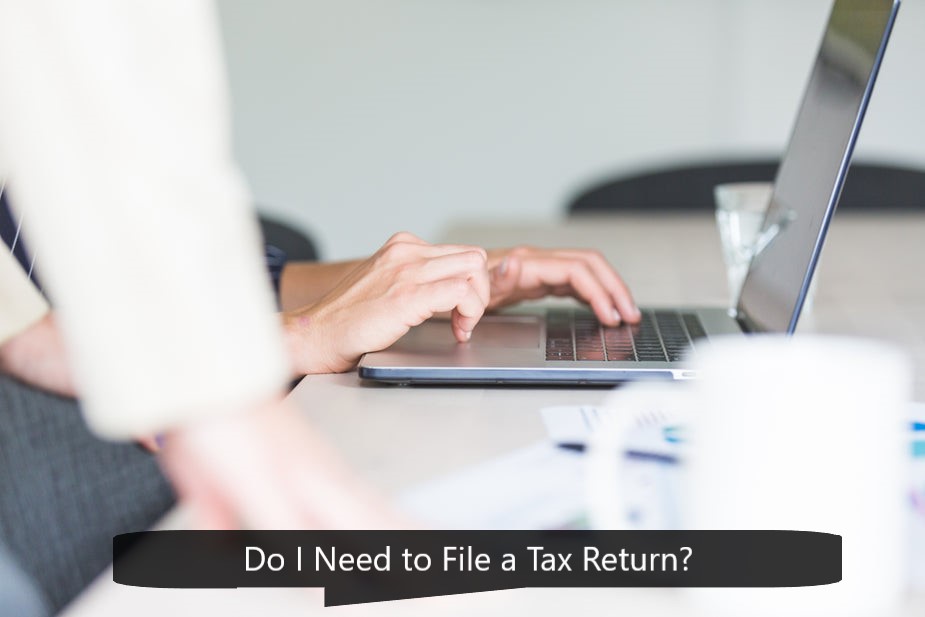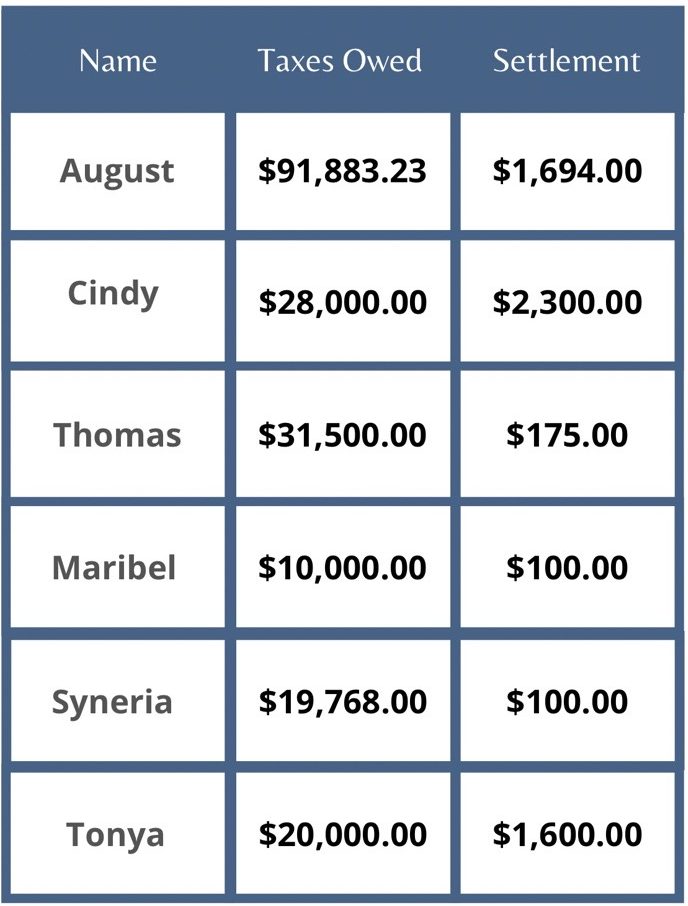Do I Need to File a Tax Return?
We Stop IRS Bank And Wage Levies in as soon as 24 Hours!

FREE Tax Analysis by the End of Your Call
Contact Us!
Do I Need to File a Tax Return?
Key Takeaways:
- It is mandatory for all U.S. citizens and residents living within the country who make over a certain income to file a tax return.
- Income Requirements to be required to file a tax return varies for Each Filing Status, including single, married, head of household, widowed, and dependent filers.
- Usually, you don’t need to file taxes if you are retired and all you receive is Social Security.
- There are benefits to filing a tax return even when you don’t have to, including tax refunds and tax credits.
- You can potentially miss out on a stimulus check or refund if you don’t file your taxes.
When the season to navigate your earnings and file a tax return arrives, some people may wonder, “Do I need to file taxes this year?” Although the short answer, if you think you need to file, is likely “yes,” there are instances where you might not actually have to pay.
Let’s take a deeper look at some of the most common questions surrounding whether you must file taxes.

Is it mandatory to file a tax return?
Yes, if you are a U.S. citizen or a resident living within the country, it is mandatory to file a tax return in the U.S. every year by the specified due date if you make over a certain amount in a year. You will also have to pay your taxes owing by this date unless you file for an extension of time or you decide on a payment plan with the Internal Revenue Service.
Who is required to file a tax return?
All U.S. citizens and residents living within the United States who make above a certain amount, either from wages or self-employment income, are required by law to file their taxes by the due date each year.
Wage Employment vs. Self-Employment Income
Wages employees usually receive a regular payroll in which income taxes are automatically withheld, whereas self-employed individuals must pay additional taxes, including income taxes and self-employment tax. Self-employment tax includes Social Security and Medicare tax that are automatically removed from the income tax of wage employees.
Income Requirements for Each Filing Status
The minimum income for citizens to be required to file a federal tax return varies based on your filing status and whether or not you are above the age of 65. Although taxpayers falling under these certain thresholds are required to file, people earning less than the minimum income requirement can still file their taxes.
Single Filer
Single filers under the age of 65 who earn at least $12,550 during the tax year will be required to file a tax return, whereas single filers over the age of 65 are only required if they make over $14,250.
Married Filer
The minimum income for married citizens to be required to file taxes depends on if they are filing jointly or separately.
If two spouses under the age of 65 are filing jointly, the minimum income requirement is $25,100, whereas if one spouse is over the age of 65, the minimum income requirement is $26,450.
When both spouses are 65 or older, $27,800 is the minimum income that would require them to file a federal tax return.
Married filers who are filing separately, no matter their age, are required to file a tax return if their earned income is over $5.
Head of household
Heads of households who are below the age of 65 are required to file a tax return if their income is at least $18,800, whereas those over the age of 65 must file their taxes if they earn more than $20,500 each year.
Qualifying Widow(er)
Widows and widowers under the age of 65 must file taxes if their income is more than $25,100 compared to those over the age of 65 who must file taxes if they make $26,450 each year.
Dependents
The minimum income requirements for filing taxes are slightly different for dependents because it considers their gross income. While a dependent may be employed and receive considered taxable income from a job, they often receive other monetary assistance that contributes to their gross income. Gross income includes both their unearned and earned income to determine if they are required to file taxes.
Dependents who are single
If a dependent child is single and under the age of 65, they must file taxes if their unearned income was more than $1,100 or if their earned income was more than $12,550.
Single dependents over the age of 65 must file taxes if their unearned income was more than $2800 or if their earned income was more than $14,250.
Single dependents over the age of 65 who are also blind have their own requirements. If their unearned income was more than $4,500 or their earned income was more than $15,950, they are required to file taxes.
Dependents who are married
Dependents under the age of 65 who are married must file taxes if their unearned income was more than $1,100 or if their earned income was more than $12,550.
Married dependents over the age of 65 must file taxes if their unearned income was more than $2,450 or if their earned income was more than $13,900.
If a married dependent who is also blind has an unearned income of more than $3,800 or an earned income of more than $15,250, they are also required to file taxes.
What other situations might I have to file taxes other than earned income?
Below, we explore some frequently asked questions regarding other situations in which you may have to file a return other than earned income.
Should I file my taxes if I am retired and all I receive is Social Security?
Most of the time, if all a retiree receives is Social Security income, they will not have to file a tax return. However, if they are married and file a return separately from their spouse who they lived with during the tax year, they must check to see if the Social Security benefits in their taxable income are greater than their standard deduction. They would still need to file taxes in the case that their taxable income is greater than their standard deduction.
Do I have to file taxes as an ex-pat outside of the U.S.?
The rules and requirements for filing taxes are generally the same for ex-patriots living outside of the United States as they are for when they live in the country. U.S. taxes are based on citizenship, not residency, so if you meet the minimum income requirements, you will still be required to pay taxes as an expatriate living abroad. There are certain tax benefits, such as the foreign earned income exclusion and foreign tax credit, that can only be received if you file a U.S. tax return.
Do I need to file a U.S. tax return as a non-U.S. citizen?
Most often, non-U.S. citizens residing in the United States who earn other income in the U.S. are required to file a tax refund. If a non-U.S. citizen is involved in a U.S. business or trade, receives U.S. income, or is responsible for filing taxes for an individual who adheres to the previous points, they will need to file a tax return.
Should I file my taxes even if I didn’t have any income?
While only people who meet the minimum income threshold are required to file, it is perfectly legal for people who didn’t have any income to file their taxes, and there are often benefits that you can receive when you e-file and are eligible for tax benefits.
What are the benefits of filing my tax return even if I don’t have to?
While there is no harm in filing a tax return if you don’t meet the minimum income requirements, there may be instances in which it is still beneficial to file a federal income tax return. Here are some reasons you should still file your taxes if you didn’t make enough money:
Even though you didn’t reach the minimum income requirement for the year, you still earned money and had income tax withheld from your paycheck.
You have already made estimated tax payments
You qualify for earned income tax credit
You qualify for a child tax credit
What are tax credits?
Tax credits can help when you owe taxes by reducing what you must pay during tax season or by increasing your tax refund. There are several types of tax credits that can benefit you by lowering what you must pay for the tax year, but even if you meet the eligibility requirements, you must still file in order to potentially receive a refund.
Refundable tax credits
When an individual receives a refundable tax credit, instead of paying taxes, they are eligible for a negative tax federal tax liability and will receive a refund from the Internal Revenue Service.
Recovery rebate credit
Individuals may be eligible for a recovery rebate credit when they are missing stimulus payments or received less than the full amount for economic impact payments.
Consequences of Failing to File Your Taxes
If you decide not to file taxes for the previous year because you didn’t earn the minimum amount of income required by the federal government last year, you will not face any consequences from the IRS, other than potentially missing out on receiving a stimulus check or refund that is only issued if you file taxes with the IRS. Although not everyone is required to file, it is usually beneficial to do so anyway to see if you qualify to tax benefits or if you can claim a tax refund.
Are you still feeling uncertain about whether or not you need to file your taxes this year? It can get confusing when trying to determine if filing taxes is the right decision for you, especially when you know that there are other scenarios involved aside from checking to see if your income is at the standard amount required. In these times of stress and frustration regarding your tax preparation, speaking with a professional can give you valuable insight into whether you should file or not.

Luis serves as the Director of Operations for Ideal Tax, overseeing a multifaceted team including case management, tax professionals, document specialists, customer support, training, and development.
We provide professional guidance to people whose lives have been affected by tax problems. To evaluate your specific tax issue and determine if you qualify for tax relief, please contact us for a free consultation. We are COVID-19 prepared, we will work with you over the phone and via e-mail.
The content of this post does not replace the advice of a licensed tax professional. Consult a qualified tax professional for questions specific to your circumstances.
Based on over 140 Google reviews
Shard Patterson / February 2-2022
Thanks, Ideal Tax awesome job.
I been dealing with Ideal tax solution for some years now, the first person that was doing my case was not up to par. I was not getting results and the IRS was coming back at me, but the new case manager that took over my case came in with an iron fist and took on my case. The end result was she fought and got my tax issue resolved for less than $100.00 awesome job.
Maria Ceja / January 29-2022
They are super professional and helpful
Omar Al-masri / December 21-2021
Honest and Reputable Firm
Mildred Tobias / November 15-2021
I was very pleased with the staff from start to finish.
Everyone was very professional yet showed so much compassion. Not meeting anyone in person, you felt their need wanting to help you in their voices. I am so pleased I found this group (Ideal Tax Solution) and highly recommend them for your tax issues.
Thanks again guys for being there, take care and be safe.
Tax Problems Don’t Solve Themselves.
Put it behind you with help from the experts at Ideal Tax
We Help Individuals & Businesses Across the Country
When you work with Ideal Tax, you can finally rest assured knowing that you will receive the most efficient tax resolution plan that is legally possible.

Our Services
We Take On the Hard Stuff For You, And We Get Results!
Tax Relief, FAQ
Tax Relief is about setting up a payment schedule or negotiating a settlement with the IRS. This is not about getting rid of your tax obligations. It’s more about helping you to pay off your tax debt.
- Are they qualified to offer tax relief services? While the IRS requires that a representative be licensed as an attorney, CPA, IRS Enrolled Agent or attorney, that doesn’t make them eligible to provide such services. Tax relief is a highly specialized area in tax law. It is crucial to ensure that the professional or firm you choose has the experience and knowledge necessary to provide the best results.
- Are the tax professionals licensed to own the company? There have been many tax relief companies that have emerged to capitalize on the growing demand for their services. However, they may not adhere to the legal and ethical compliance requirements of professional licensure. There can be a temptation for firms not to adhere to the rules of licensed ownership. This could lead to a tendency to prioritize sales goals over ethical business practices.
- What’s their reputation? This is a difficult question because companies who promote themselves online will put information that they want you to see, and exclude the information they don’t. It is important to use objective and independent sources. To see what customers have to say about their experiences with a company, check out the Better Business Bureau and Ripoff Report. Avoid sites such as “Best of”, where companies pay to be included in a positive manner.
Experience and performance are more important than any type of license to provide the best representation. A Tax Attorney can represent taxpayers in Federal Tax Court. However, very few cases involving back tax end up there. Most cases can be resolved by the IRS administrative process. It is therefore important to hire a representative who is both familiar with the Internal Revenue Manual, IRS Tax Code and is skilled in applying the rules. It is important to be able to talk to the potential representative and not just a salesperson to make the best decision.
Tax relief services can cost anywhere from a few hundred to thousands of dollars. It all depends on the type and number of services you need. The cost of tax relief services can also vary depending on the person you choose to represent you and how they bill you.
The IRS is the only entity that can make the final decision. However, qualified tax relief professionals can help you determine if your situation qualifies for the program. Our CPAs, EAs have been able to determine whether clients are eligible for the program with an accuracy of more than 90%. OICs that are successful average savings of 95% on the balance owed.
Reputable tax relief companies will conduct a thorough assessment of your situation with licensed tax relief professionals. They will assess your situation and determine the best programs for you. If done correctly, you will get a clear idea of what is possible.
Contact us
- 1 (888) 720-0442
- customercare@idealtaxsolution.com
- 2 MacArthur Pl, Suite 300 Santa Ana, CA. 92707

